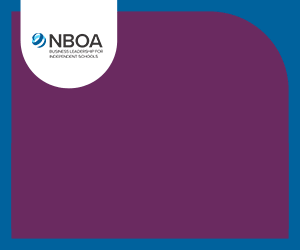
NBOA President and CEO
As someone who has worked in education for most of my career, I’ve always appreciated the seasonal nature of our sector. The optimism of a new school year in the fall, the successes and setbacks of winter, and the chance to identify opportunities for quality time over the summer. It wasn’t until now, however, that I saw this cycle in terms of the rituals that help distinguish and elevate our schools. Rituals make our schools more than workplaces; they are communities.
This is why a recent Harvard Business Review article, “The Restorative Power of Ritual,” caught my eye. Author Scott Berinato interviewed Harvard Business School professor Mike Norton, who has studied the impact of rituals on individual wellness. “Rituals in the face of loss can help us feel less grief, and rituals with families can make us feel closer,” Norton explained. “And by rituals we don’t mean elaborate religious ceremonies…The majority of people’s rituals are private and idiosyncratic to them.” These words helped me understand how our rituals are more important than ever during this time of extreme separateness because they give us a sense of control and normalcy.
Our rituals are more important than ever during this time of extreme separateness because they give us a sense of control and normalcy.
Something as simple as a morning routine can be ritualistic. Before the pandemic, I would wake up, eat breakfast with my daughter and race out the door by 7:30 to get her to the school bus. When I arrived at the office at 8, I rewarded myself with my second cup of coffee. This simple routine now seems foreign and distant. And I now understand how it provided order to the start of sometimes hectic days of planned — and more often, unplanned — activities and events.
No doubt this sounds familiar to business officers. Norton stresses that naming rituals is particularly important. What are the professional or personal rituals that provide control and order in your day? How many have you lost? How can you reinvent them today?
What are the professional or personal rituals that provide control and order in your day? How many have you lost? How can you reinvent them today?
Rituals don’t have to happen organically to be effective, according to Norton. They can be invented and inserted into your day. I’m sure you’re familiar with the explosion of virtual happy hours. The NBOA staff has now participated in a few, but truth be told, with our distributed staff model, we never had happy hours on a regular basis before. As with many activities born out of this pandemic, the tradition may continue after the crisis ends.
I know you and your fellow school leaders have been thinking a lot about the rituals that your students have lost. I can only imagine how the cancellation of prom and commencement are impacting the Class of 2020, for example. I also know that many of you have been working overtime to restore that sense of normalcy and ritual on students’ behalf. Western Reserve Academy has done this by reimagining the school’s “morning meeting” for students. “It really has helped to bring a sense of normalcy and familiarity in an otherwise abnormal and unfamiliar time,” said Tom Arnold, chief financial and operating officer.
And while it remains important to help our student communities regain and reinvent rituals, consider also the needs of your staff, your colleagues and yourself. You may find a restorative effect in new routines and more than that, new ways to connect and to lead long after this crisis.

Follow President and CEO Jeff Shields @shieldsNBOA.
From Net Assets NOW, April 21, 2020. Read past issues of CEO Notebook.




